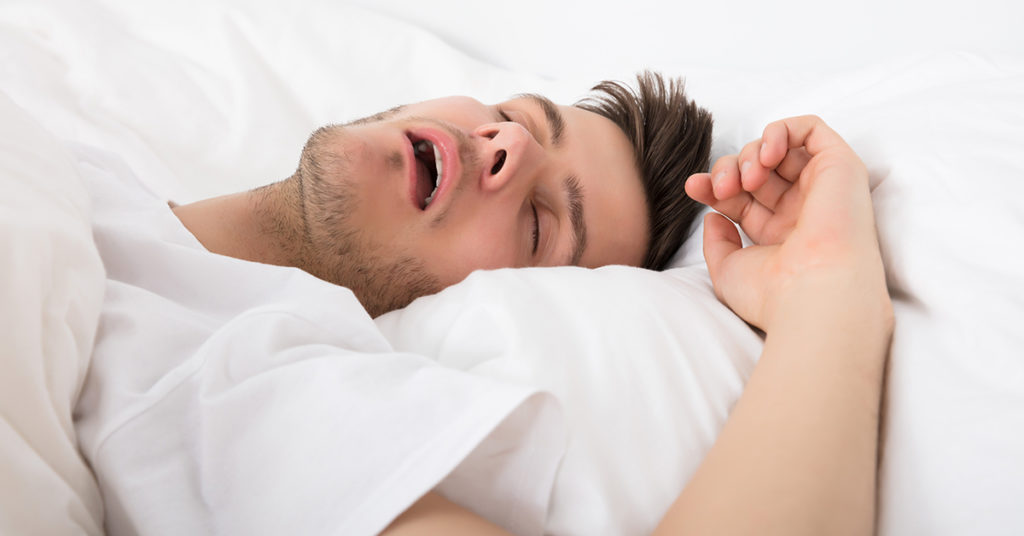
Imagine if you had trouble breathing while you’re awake, causing you to gasp for air, choke or cough. You’ll probably head to the nearest emergency room in a panic.
This is exactly what happens to about 22 million people in the United States when they sleep. This sleep disorder is called sleep apnea, and it can lead to many health issues if left untreated.
Sleep apnea can affect anyone, and can cause breathing pauses accompanied by choking or gasping during sleep. It can lead to health problems like stroke, diabetes, high blood pressure, cardiomyopathy, depression, heart failure, and heart attacks.
Is loud snoring leaving you feeling tired during your waking hours? Learn the signs and symptoms of sleep apnea.
Types of Sleep Apnea
There are two main types of sleep apnea that you need to know about.
Obstructive sleep apnea – this is caused by partial or complete blockage of the airway. This type of sleep apnea is more common, and it happens when the throat muscles become relaxed while you’re sleeping, blocking the airway and causing loud snoring and pauses in breathing.
Central sleep apnea – this involves the central nervous system and occurs when there’s an issue with how the brain sends signals to the breathing muscles. If you have central sleep apnea, your airway is not blocked but your brain fails to tell the muscles to breathe.
What Causes It?
Anyone can have sleep apnea, but here are the common risk factors:
- Over 40
- Male
- Excess weight/obesity
- Has a family history of sleep apnea
- With a large tongue, large tonsils, a large neck size, or a small jaw
Symptoms
If a number of these symptoms describe you, there’s a big chance that you may be suffering from sleep apnea.
- You snore loudly.
- During sleep, you sometimes wake up abruptly with shortness of breath.
- You normally wake up to use the bathroom.
- You wake up with a sore throat or dry mouth.
- You wake up gasping, snorting, or choking.
- You have insomnia.
- You typically wake up with a headache.
- You experience mood swings and are irritable.
- Excessive daytime sleepiness.
- While awake, you have concentration, attention, or memory problems.
- You have risk factors for sleep apnea which includes obesity, smoking tobacco, or drinking alcohol.
How Your Dentist Can Help
If you are struggling with sleeplessness and snoring, give your Dallas dentist a call. Sleep disturbances and snoring are common sleep apnea symptoms, and your oral health might be the culprit. During your appointment, we may ask about tooth grinding and look for worn tooth surfaces. Tooth grinding can cause a spike in cavities, as well as receding and inflamed gums.
When you grind your teeth and tense your jaw, it signals your brain to wake up so you can breathe properly. Tooth grinding, however, is just one of the symptoms of sleep apnea. A tongue with scalloped edges, a small jaw, or redness in the throat are also telltale signs.
The good news is, sleep apnea is treatable. If you think you have sleep apnea, don’t hesitate to contact us at 214-396-7876.
Sources:
“Sleep Apnea Information for Clinicians,” Sleepapnea.org, https://www.sleepapnea.org/learn/sleep-apnea-information-clinicians/
“Sleep Apnea – Symptoms & Risk Factors,” SleepEducation.org, http://sleepeducation.org/essentials-in-sleep/sleep-apnea/symptoms-risk-factors
“Sleep,” Harvard School of Public Health, https://www.hsph.harvard.edu/obesity-prevention-source/obesity-causes/sleep-and-obesity/
“Sleep Apnea,” Mayo Clinic, https://www.mayoclinic.org/diseases-conditions/sleep-apnea/symptoms-causes/syc-20377631
